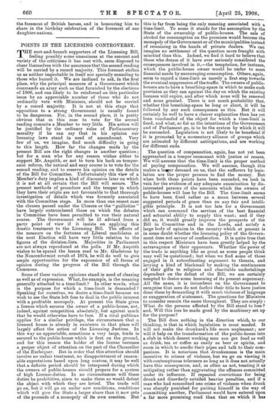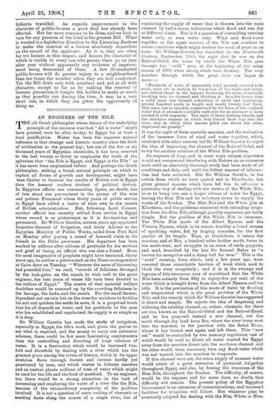POINTS IN THE LICENSING- CONTROVERSY. T HE root-and-branch supporters of the
Licensing Bill, feeling possibly some uneasiness at the amount and variety of the criticisms it has met with, seem disposed to cheer themselves with the assurance that the second reading will be carried by a record majority. This forecast strikes us as neither improbable in itself nor specially consoling to those who hazard it. We are inclined to ask, in the first place, why the principal measure of a Government which commands an army such as that furnished by the elections of 1906, and one likely to be reinforced on this particular issue by an appreciable number of those who do not ordinarily vote with Ministers, should not be carried by a record majority. It is not at this stage that opposition to a strong Government is usually found to be dangerous. For, in the second place, it is pretty obvious that in this case to vote for the second reading commits a Member to very little. His action will be justified by the ordinary rules of Parliamentary morality if he can say that in his opinion our licensing laws stand in need of amendment. Very few of us, we imagine, find much difficulty in going to this length. How far the changes made by the present Bill are the right changes is another question; but for a man who for any reason wishes either to support Mr. Asquith, or not to turn his back on temper- ance reform, the natural and easy course is to vote for the second reading, and to reserve his opinion on the details of the Bill for Committee. Unfortunately this view of a Member's duty implies a kind of discussion later on which it is not at all certain that the Bill will secure. The present methods of procedure and the temper in which they have their origin are not favourable to that thorough investigation of details which was formerly associated with the Committee stage. In more than one recent case the clauses passed under the Closure or the " guillotine " have largely outnumbered those on which the debates in Committee have been permitted to run their natural course. The Government will be ill advised from a party point of view if it insists on applying this drastic treatment to the Licensing Bill. The effects of the measure on the fortunes of Liberal candidates at the next Election will have very little relation to the figures of the division-lists. Majorities in Parliament are not always reproduced at the polls. If Mr. Asquith wishes to be spared the lesson read to Mr. Gladstone by the Nonconformist revolt of 1874, he will do well to give ample opportunities for the expression of all forms of opinion during the progress of the Bill through the Commons.
Some of these various opinions stand in need of clearing as well as of expression. What, for example, is the meaning generally attached to a time-limit ? In other words, what is the purpose for which a time-limit is demanded ? Speaking for ourselves, we desire a time-limit because we wish to see the State left free to deal in the public interest with a profitable monopoly. At present the State gives a license which secures the owner of a public-house, not, indeed, against competition absolutely, but against much that he would otherwise have to face. If a rival publican applies for a similar privilege, the circumstance that a licensed house is already in existence in that place will largelj affect the action of the Licensing Justices. In this way an appreciable, sometimes a very large, trade is secured to the public-house which is first on the ground, and for this reason the holder of the license becomes a proper object of attention on the part of the Chancellor of the Exchequer. But in order that this attention should involve no unfair treatment, no disappointment of reason- able expectations based upon long custom, it may be well that a definite period should be interposed during which the owners of public-houses should prepare for a system of high License-duties. In no circumstances will these duties be prohibitive, since to make them so would defeat the object with which they are levied. The trade will go on, but it will go on under new conditions, conditions which will give the- State a larger share than it now gets of the proceeds of a monopoly of its own creation.' this is far from being the only meaning associated with a, time-limit. To some it stands for the assumption by the State of the ownership of public-houses. The sale of alcohol for consumption on the premises would become the monopoly of the Government or of the municipalities instead of remaining in the hands of private dealers. We can imagine no settlement of the question more fraught with mischief than this. Indeed, we find it hard to believe that those who dream of it have ever seriously considered the consequences involved in it,—the temptation, for instance, which the public-house owner would be under to meet financial needs by encouraging consumption. Others, again, seem to regard a time-limit as merely a first step towards the eventual suppression of the traffic. The owners of public.. houses are to have a breathing-space in which to make such provision as they can against the day on which the existing licenses will expire, and after which none will be renewed and none granted. There is not much probability that, whether this breathing-space be long or short, it will be followed by any such consequence as this. But it will certainly be well to have a clearer explanation than has vouchsafed of the object for which a time-limityet- been is fixed, and what, so fai as the intentions of the Government and of Parliament go, is to be the system by which it will be succeeded. Legislation is not likely to be beneficial if it is promoted by a momentary alliance of groups which are animated by different anticipations, and are working for different ends.
The question of compensation, again, has not yet been approached in a temper consonant with justice or reason. We will assume that the time-limit is the proper method of paying compensation. We will assume, though this makes a lasiger demand on us, that the sufferers by legis- lation are the proper persons to find the money. But when both these points have been conceded, we look in vain for the evidence of any adequate examination by dis- interested persons of the amounts which the owners of public-houses will lose by the Bill. The time-limit seems to have been fixed rather as a mean between several suggested periods of grace than on any fair and intelli- gible principle. It is not too late for a Government which can command i he services of the best financial and actuarial ability to supply this want ; and if they did so, it would greatly improve the prospects of the Bill in Committee and in the Lords, and satisfy a large body of opinion in the country which at present is in some doubt whether the licensing policy of the Govern- ment does not savour of confiscation. It is quite true that in this respect Ministers have been greatly helped by the extravagance of their opponents. Whether the power of the trado is anything like as great as some people think may well be questioned ; but when we find some of those engaged in it subordinating argument to threats, and. levying a, kind of blackmail by making the continuance of' their gifts to religious and charitable undertakings dependent on the defeat of the Bill, we are certainly tempted to desire some lessening of its present supremacy. All the same, it is incumbent on the Government to recognise that men do not forfeit their title to have justice done them by demanding it with much violence of language or exaggeration of statement. The questions for Ministers to consider remain the same throughout. They are simply : What do the persons affected by the Bill stand to lose ? and, Will this loss be made good by the machinery set up for the purpose?
The Bill does nothing in the direction which, to our thinking, is that in which legislation is most needed. It will not make the drunkard's life more unpleasant ; nor will it help on the transformation of the public-house into a club in which decent working men can get food as well as drink, tea or coffee as easily as beer or spirits, and room in which to smote their pipes and talk to their com- panions. It is notorious that drunkenness is the main incentive to crimes of violence, but we go on viewing it with contemptuous tolerance so long as it does not actually have this consequence, and, as often as not, treating it as mitigating rather than aggravating the offences committed., under its influence. If repeated convictions for being; drunk and disorderly entailed heavier penalties, and if a man who had committed one crime of violence when drunk was sharply punished for putting himself in the way of committing another, Parliament would have entered upon a far more promising road than that on which it has hitherto travelled. As regards improvement in the character of public-houses a good deal has already been effected. -But far more remains to be done, and we look in vain for any promise of the kind in the present Bill. What is wanted is it legislative direction to the Licensing Justices to make the renewal of a license absolutely dependent on the record of the applicant. As it is, they are often far too lenient in this respect, and houses the character of which is visible to every one who passes them go on year after year without apparently any evidence of improve- ment being demanded of them. A few ill-conducted public-bouses will do greater injury to a neighbourhood than ten times the number when they are well conducted. Yet the Bill deals only with numbers and not at all with character, except so far as by making the renewal of licenses precarious it tempts the holders to make as much as they possibly can during the time, it may be a very short one, in which they are given the opportunity of doing so.























































 Previous page
Previous page